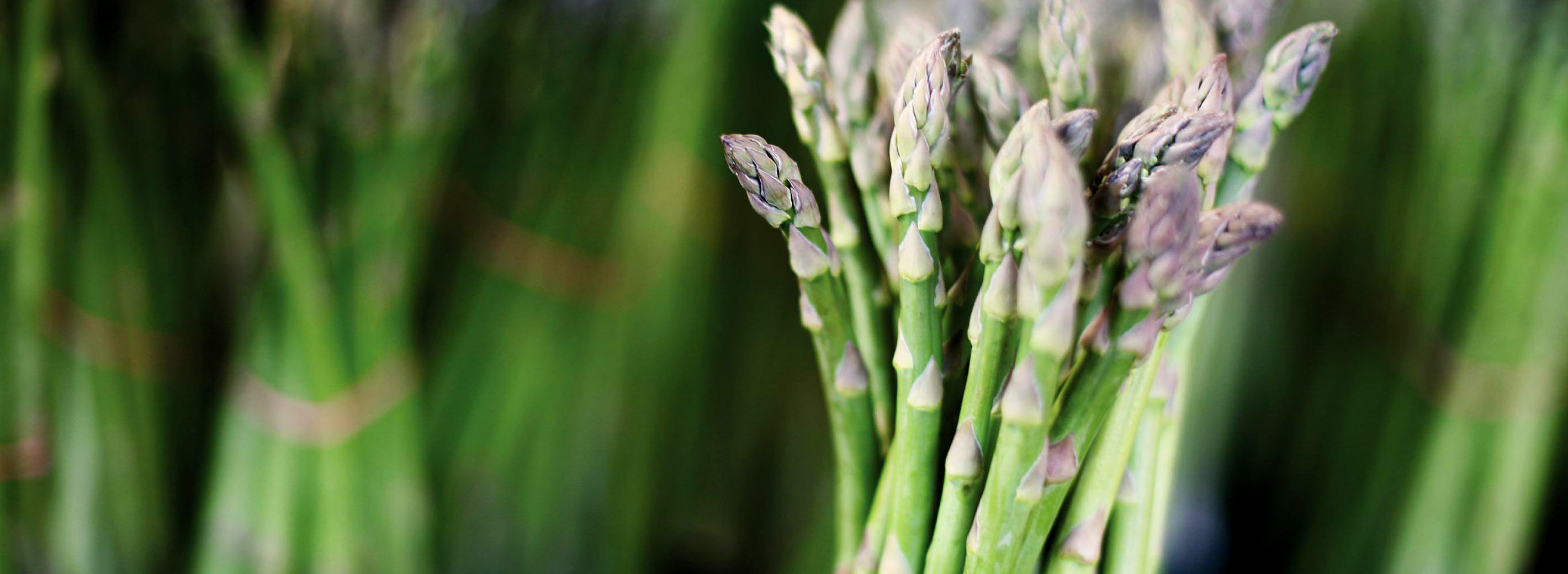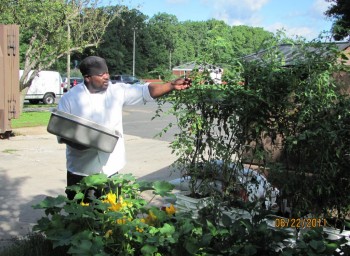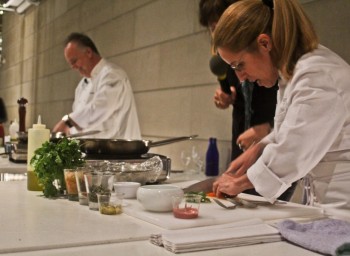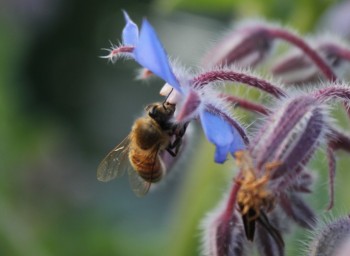The Eat Local Challenge has become one of my favorite celebrations each year. While many of our usual holidays come with prescribed dishes, such as turkey and stuffing for Thanksgiving, brisket and matzoh ball soup for Passover, and cookies topped with red and green sprinkles for Christmas, the Eat Local Challenge menu is always different — year to year, chef to chef, and region by region. The challenge is to create an whole menu where every ingredient (except for salt) comes from within 150 miles. While this is no easy task, I also find the challenge to be encouraging. Whether a chef or an eater, it encourages everyone to explore unusual flavors – found on our local farm and range lands and in our forests, lakes, and oceans, to learn about new producers, and tap into our inner creative spirit.

Blog: People
+ Blog Categories
Employee Spotlight: Arthur Curtis, Making Wash U Folks Smile Every Day
- Blog
This video is the first in a series highlighting Bon Appétit employees across the country and the wonderful work they do. Here we are proud to introduce a man who brings a smile to countless faces every day—Arthur Curtis, line server at Bon Appétit at Washington University in St. Louis.

Saint Joseph College Harvests First Garden Bounty
- Blog
Gardens are popping up on college campuses everywhere, and the most recent crop includes one at Saint Joseph College in Hartford, CT. The team there harvested its first bounty this year — butternut squash, tomatoes, lettuces, radishes, peppers, herbs, and more!

White Bean Hummus with Oregano
- Blog
By Kristen Rasmussen, MS, RD For this month’s well being challenge, we encourage you to provide your body with more nutrients and fiber and decrease your carbon footprint by enjoying more plant- based proteins. Demonstrate your commitment to increasing vegetable proteins in your diet by posting photos or comments about your plant-based protein meals and experiences on our Facebook page wall. This white bean hummus recipe s a great way to get started. White Bean Hummus with Oregano 1 can of white beans, drained and rinsed* 3-4 tablespoons tahini 1-2 tablespoons olive oil Juice from 1/2 lemon 1/2 -1 teaspoon salt 3 sprigs fresh or 1 teaspoon dried oregano *In Bon Appétit kitchens, menu items containing beans are made with cooked dry beans. You can substitute cooked dry beans for canned beans in your home as well. They may take longer to prepare, but have fresher […]

Terzo Piano Celebrates Local Farmers at Farm to Fork Fest
- Blog
Terzo Piano in Chicago, IL, loves to support and celebrate local farmers every day — as well as in a now-annual event it calls Farm to Fork Fest, a special dinner focused on educating guests about where food comes from and why buying from local farms is important.

Gallaudet University Goes All Out For Eat Local Challenge 2011
- Blog
To any Gallaudet University students walking into the Bon Appétit café on Tuesday Sept. 27, it seemed like a transformation had occurred. The normally wood-colored tables were decked out in blue and red checkered picnic-style cloth, and the entire café staff had donned blue jeans and farmers hats. It was Eat Local Challenge Day, and the point was to celebrate local, farm-fresh food. Students scattered themselves at different stations throughout the café in honor of the event. One group hosted a Taste Test, challenging their peers to guess which tomato was local (picked fresh that day from the Gallaudet Community Garden) and which was conventional (from California). Green Gallaudet, the on-campus environmental group, spoke with passers-by about the impacts our food choices have on the environment (did you know that by eating one less hamburger a week, you can significantly […]

Grain-fed vs. grass-fed beef — and somewhere in between?
- Blog
Thanks to Michael Pollan‘s book The Omnivore’s Dilemma and the documentary Food, Inc., more people have become aware that the majority of cows in this country are raised on a grain-based diet for the last few months of their lives — and why that’s problematic for the health of the cows, the health of the humans who eat them, and the environment. The short version: Grains such as corn and soy are cheap carbohydrates that make cows get fat fast (not unlike humans). But cows’ digestive systems were designed to handle a high-fiber diet of mostly fresh grass or hay, with some natural grains. High-grain corn and soy diets — and the feedlots in which they are stuffed with them — cause many cattle to get sick, and encourage the prevalence of antibiotic-resistant E. coli as well. But as with […]

Chefs Get Creative in Chopped! Competition at Emmanuel College
- Blog
Teams of highly trained, ultra-competitive Bon Appétit chefs have been making their way around the Eastern Seaboard competing in elite contests modeled after Chopped!, the hit Food Network television show. Chefs compete to create culinary masterpieces from a box of mystery ingredients in a short amount of time. Each ingredient in the box must be incorporated into the dish for that round, and given the often random combinations of items, that’s often no easy task! The “steaks” are so high, only the brave need apply.

We’re No. 1! And No. 2, 4-6, 17, 20, and 22!!!
- Blog
This week, as millions of college students headed back to school, Newsweek/The Daily Beast released its College Rankings 2011, with categories including Most Service-Oriented, Most Beautiful, Future CEOs, and — most important to us — Best College Food, honoring those schools that “go above and beyond to make it great.” We are proud to say that on that list of 25, Bon Appétit Management Company teams feed a whopping eight of them:

How We Can Bee the Change: Pollination Panel Discussion at Seattle U
- Blog
Recently at Seattle University, Bon Appétit Management Company and Slow Food Seattle cosponsored a free showing of the new documentary Vanishing of the Bees, which was directed by George Langworthy and Maryam Heinen and narrated by actress Ellen Page. An astonishing 350 people attended the showing and the panel discussion with local beekeepers that followed.
